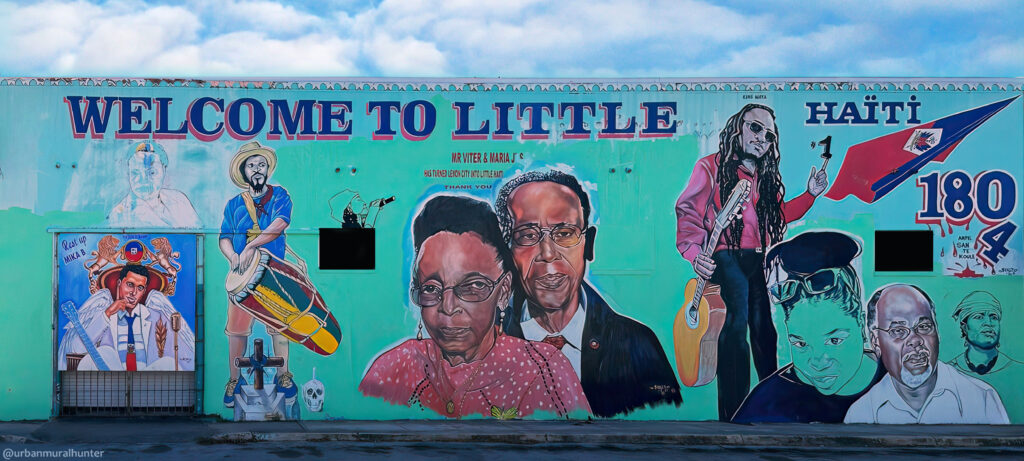By Neuteyshe Felizor, Black Voters Matter
One of my goals is to raise awareness and restore South Florida’s Haitian communities, which have been disrupted by cultural erasure, gentrification and redistricting.
Intense levels of gentrification are one of the most visible examples of climate injustice. My mother, who immigrated from Haiti to Miami in 2002, mentions she still has memories of the North Miami we once called home.
“This area has changed so much,” she relays.
“Manmi, that’s gentrification,” I tell her.
I, too, recount feelings of alienation when I frequent this area among others. A tight-knit community that was mostly Haitian businesses and families serving those in their own neighborhoods has evolved into a now-industrialized locality full of “innovators” and hungry capitalists.

Our environment affects everyone, everywhere, but the direct effects are unfortunately more prone to Black and indigenous people. Environmental racism has led to increased mortality rates, negative health outcomes and medical risk factors for marginalized groups, especially Black people.
In Miami’s Little Haiti, developers have been purchasing land to build high-rise buildings, which creates a heat island effect by blocking winds. This issue has a grave effect not only on health and the environment but housing affordability.
An influx of wealthy residents migrates to these high inland areas, comfortably, to evade rising sea levels further south. As a result, the exponential market increase for land, goods and services leaves native residents no other financial option but to migrate elsewhere, removing the homes in which generations of Black families have raised their children.
In contrast, the Haitian woman who still braids my hair – and has been for the last 15 years – remains in the same location on 167th Street in North Miami. Vagabonds, drug addicts and dealers frequent the plaza. Yet newly built Starbucks establishments stand with conviction across the street and million-dollar new construction houses compete with the rising rates of homelessness.
When I canvass the neighborhoods of Little Haiti, Liberty City and North Miami, many Black people are vexed, some are misinformed, but everyone anticipate some sort of change – especially considering this 2024 presidential election.
In July 2023, while canvassing in Allapattah, my Black and brown volunteers at Engage Miami had the police called on them by a white resident.
Our South Florida partners at Black Voters Matter – the BLK Collective and Smile Trust – have been addressing the issue of Miami’s developers attempting to take over Liberty Square, which is the only marginalized area that has not flooded. These righteous efforts have led to their racial harassment by the Proud Boys with no law enforcement interference.
This demonstrates that climate injustice doesn’t just displace Black and brown people – it makes it easier for them to be racially targeted. Climate injustice is not just about climate change, but how governments and bureaucracies consistently prioritize the needs of white people at the cost of Black life.
We have been socialized to view climate change issues from a separatist lens. Many believe things like raising property taxes to clean up neighborhoods with “higher income value” will provide clean living for the niche who can afford it.

Black farmers and activists such as Aniya Butler and Wanjiku Gatheru, or Lori Caldwell and John Francis — although seldom recognized in green spaces — have long recognized the need for not just climate action in Black communities, but the reimagined and nuanced media narratives of climate change’s affects onto our communities.
As marine biologist Ayana Elizabeth Johnson said, “To white people who care about maintaining a habitable planet, I need you to become actively anti-racist. I need you to understand that our racial inequality crisis is intertwined with our climate crisis. If we don’t work on both, we will succeed at neither.”
Toxic corporations that intentionally place factories and coal mines near Black and brown neighborhoods as “sacrifice zones,” because they view us as numbers rather than as humans, are not just damaging our lives in the short term but also those of white, affluent people in other areas long term.
Environmental justice is social justice. It is political justice. It is public health justice. It is economic justice. It is racial justice.
Climate justice is about affordable and weatherized housing and utilities, access to quality air and water, and access to healthy, locally grown food.
It is voting for elected officials who are informed about the intersectionality of environmentalism and white supremacy, and whose values advance the struggle toward Black freedom and liberation across all fronts.
Neuteyshe Felizor is the South Florida regional organizer at Black Voters Matter.
If you are interested in submitting an opinion piece to The Invading Sea, email Editor Nathan Crabbe at ncrabbe@fau.edu. Sign up for The Invading Sea newsletter by visiting here.



